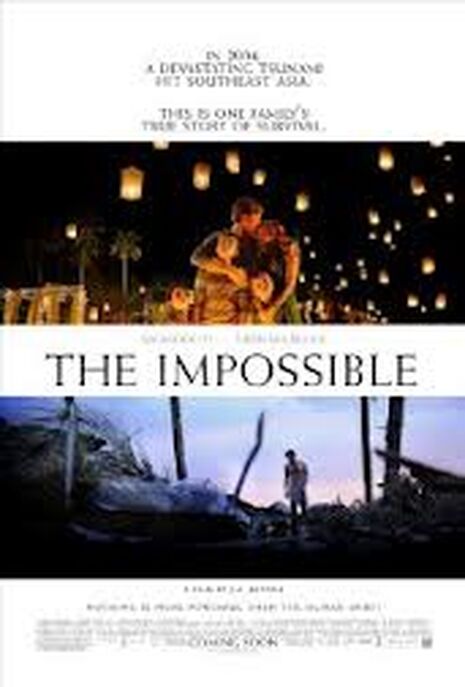Film: The Impossible
Harry Jackson feels uneasy about the artistic judgements behind Bayona’s visually stunning film.

Following the story of one family’s experience of displacement after the 2004 Indian Ocean tsunami, Juan Antonio Bayona’s The Impossible is an engaging, often rewarding, but deeply problematic piece of drama. Elevated by stand-out performances from Ewan McGregor and newcomer Tom Holland, and featuring a stunning reproduction of the disaster itself, Beyona’s film is, in many respects, formally excellent. Nonetheless, the euphoric and uplifting story provokes a feeling of distinct unease in the viewer, given its failure to account for the massive and irreversible loss of human life the tsunami left in its wake. Despite being finely executed, with only a few missteps, the end product is tarnished by its fundamental misconception.
Regardless, the film must be commended for what it does get right. Much has been made of the pivotal tsunami and the praise is entirely justified. It’s a very powerful, highly cinematic piece of work. Bayona’s ability to sustain such a visceral sequence for the length that he does is nothing short of awe-inspiring, and the audience is led to utter revulsion by the sight of limp bodies being thrown around by errant debris. Unfortunately, the sequence is somewhat undermined by the relentless foreshadowing that precedes it, resulting in the most risible moment of the entire film – an image of the resort from the water, set to ominous music, as if we’re looking through the eyes of a serial killer in a bad slasher movie. Such an egregious error in judgement is hard to understand, especially in a film with so many aspects to recommend.
What really makes The Impossible worth seeing, despite its flaws, is the quality of the drama that follows the tsunami. Split in two, the family’s story is well served on both ends by remarkable performances from Ewan McGregor, as the father stranded near the resort with his two youngest sons, and Tom Holland as McGregor’s eldest son, washed away by the tsunami with his mother. McGregor deserves particular praise, not least for a breathtaking scene in which he wails into a mobile phone, releasing all the pain and torment that the uncertainty of his situation carries with it. It’s certainly a much better treatment of such uncertainty than we find elsewhere in the film; I’m thinking, in particular, of an appalling scene where Geraldine Chaplin consoles McGregor’s youngest sons by explaining to them the ‘beautiful mystery’ of not knowing whether your loved one are alive or dead.
In contrast to McGregor, Naomi Watts’ Oscar-nominated performance is testament to how utterly barren the field for nominations was this year. Her work is adequate, and her very physical expression of severe pain is often convincing, but she contributes far less to her scenes than Tom Holland, who manages to make his character extremely interesting despite being saddled with some rather silly dialogue near the start of the film.
As both halves of the family seek the other, it all builds to a climax that is both joyous and distasteful. As the title and promotional material suggest, the film reaches its emotional apex with a seemingly impossible reunion. The ending succeeds in spite of itself, and manages to be extremely uplifting despite being stunted by the need to re-unite, at that point in the story, four strands of the family in three separate moments. But as the family rides off into the sunset, having had their happy ending, you can’t help but wonder: was it ever appropriate to make a film about a comfortable, western family recovering from a ruined holiday, when the same tsunami had such a horrendous, irreversible, and deleterious effect on so many others?
 News / Cambridge students accused of ‘gleeful’ racist hate crime4 December 2025
News / Cambridge students accused of ‘gleeful’ racist hate crime4 December 2025 News / Churchill announces June Event in place of May Ball3 December 2025
News / Churchill announces June Event in place of May Ball3 December 2025 News / Uni redundancy consultation ‘falls short of legal duties’, unions say6 December 2025
News / Uni redundancy consultation ‘falls short of legal duties’, unions say6 December 2025 News / Cambridge cosies up to Reform UK30 November 2025
News / Cambridge cosies up to Reform UK30 November 2025 Comment / Don’t get lost in the Bermuda Triangle of job hunting 24 November 2025
Comment / Don’t get lost in the Bermuda Triangle of job hunting 24 November 2025








